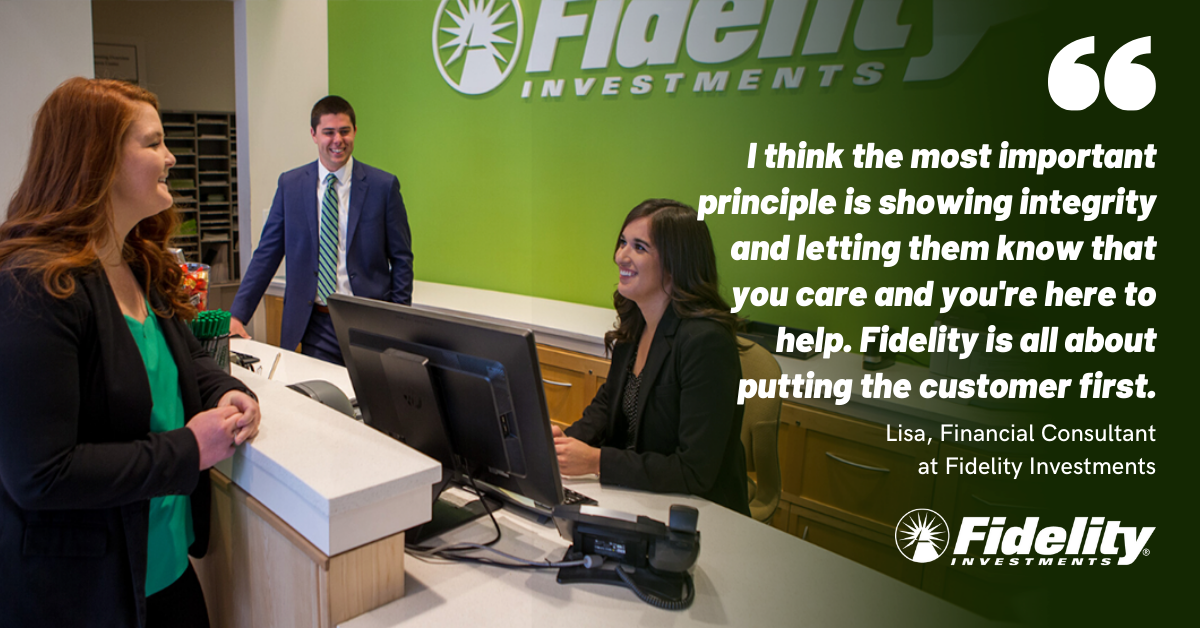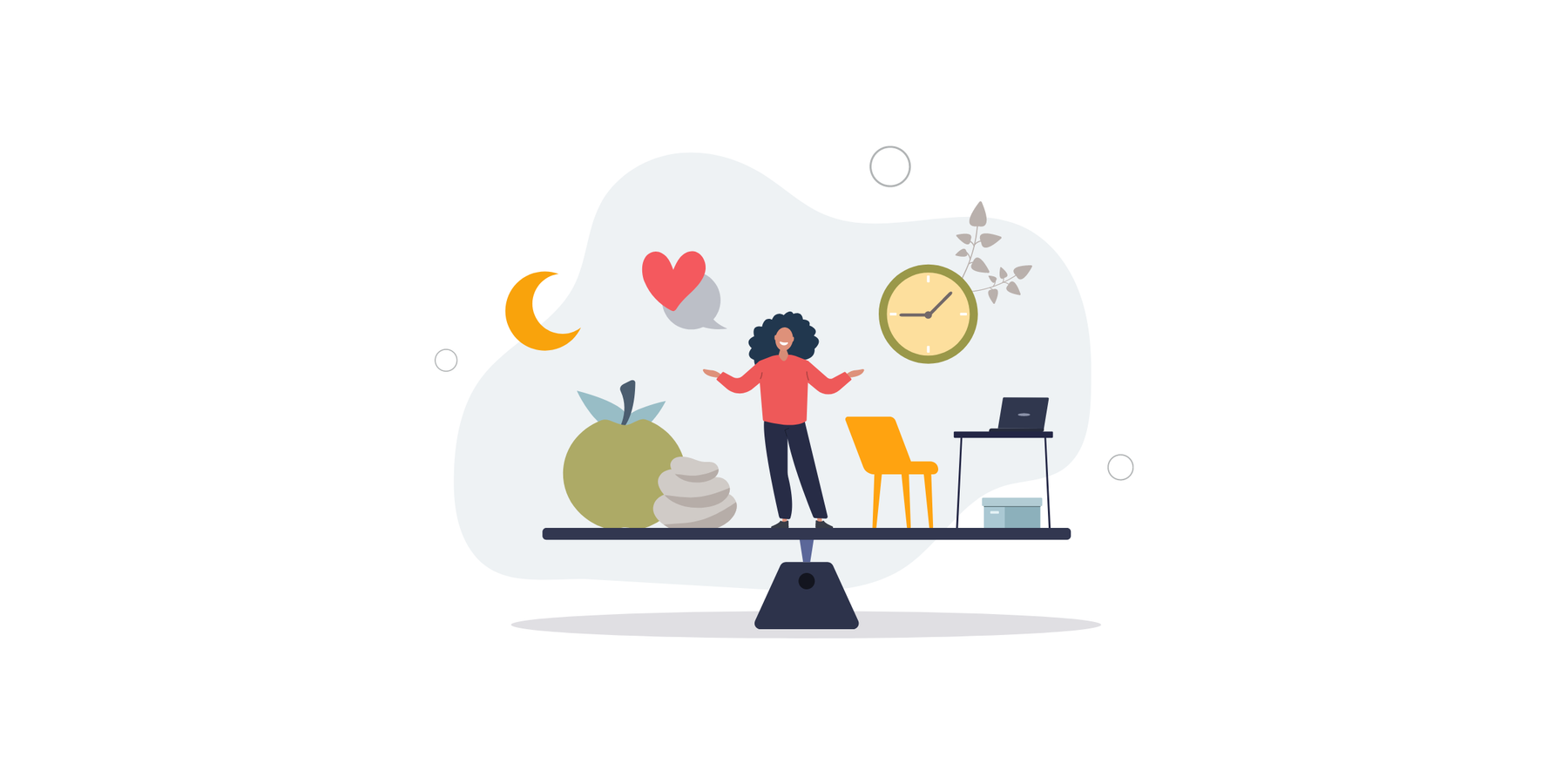When was the last time a client told you how you've impacted their family? For Financial Consultant, Lisa, this isn't an unusual occurrence!
Understanding the needs and wants of her clients on a more personal level is at the heart of what Lisa does as a Financial Consultant at Fidelity. She accompanies her clients through different stages of life and helps them makes changes to their financial plans as needed. She keeps a box of tissues in her office for when clients experience tragedy and celebrates with them when they reach their financial goals.
This highly personal working relationship is the norm at Fidelity Investments, where Financial Consultants present customized financial products and services for every stage in their clients' lives. To do this effectively, Fidelity utilizes a client-based approach grounded in relationship building. Fidelity also leverages a team of professionals with varied expertise to design custom financial plans. Lisa loves working at Fidelity because its culture, as well as its training and development resources, have allowed her to grow in the areas she feels are most important to her role. For Lisa, the most important skills of a Financial Consultant are active listening, organizational skills, and being personable. Additionally, her business unit's remote work policy affords her needed flexibility as she transitions to a new stage of life as an empty nester and the primary caregiver of her aging mother.
To better understand Fidelity's human approach, both with their clients and their employees, we asked Lisa some questions about her role and experience with the company.
Read on to learn more about what it takes to be a successful Financial Consultant at Fidelity and be sure to check out their open roles!
What does the Financial Consultant role at Fidelity entail?
I meet with Fidelity's clients semiannually for reviews, and we go through their investments, financial planning goals, and risk tolerance. We create a sound plan that's flexible, so we can adapt and change it as clients are going through different events in their lives: in the accumulation phase and when they decide to retire, helping to develop a sustainable stream of income.
As things transpire in their lives, we touch on big decisions like when they should retire, legacy transfer and planning, and estate planning.
How do you go about getting to know the clients you support in order to best consult with them?
The key is active listening, asking open ended questions, and finding out what is most important to the client. You need to know what their goals are, and what their fears are, because this is their money.
I use my own family experience and share my other clients' stories and how I've helped them, especially with difficult decisions. I meet with the families and talk about estate planning. Or when a spouse passes away, I help transition assets to the surviving spouse. There's a lot of emotion that comes into play, and you have to be there as a sounding board and help them move forward. There's a box of tissues in my office for those emotional moments, but there are also wonderful things, like hearing about grandchildren and helping clients pay for their children's education.
Which guiding principles do you follow when working with clients? How do they inform your work?
We start with a financial plan by finding out what clients' goals are, their risk tolerance, their values. I am also here to educate clients and build trust. I think the most important principle is showing integrity and letting them know that you care and you're here to help. Fidelity is all about putting the customer first.
How does this come through when you work with clients?
I let the needs of the client determine which solutions we implement. My compensation plan is in line with the needs of the client. It's about helping retain assets and grow assets, and building on client relationships, not being incentivized solely on commission.
What resources/support does Fidelity provide you with to help you meet clients' needs and put the client first?
Fidelity works in a team approach. There are many different resources. One of the best examples of this is the relationship manager. The relationship manager I work with helps the clients with most of their service needs. She's really instrumental, because I support a large book of clients and she enables me to focus on their planning needs.
There are also a wide range of specialists that can be called on to ensure each aspect of a plan is reviewed by experts from senior portfolio specialists for managed accounts, to fixed income specialists, regional planning consultants and estate planners.
Beyond that, Fidelity offers Financial Consultants ongoing training opportunities including in-office coaching, off-site trainings, and phone/web-based training. Paired with world-class technology and software, Fidelity associates are equipped with support that enables long-term growth.
That's awesome. It's great that you have so much support.
Yes, absolutely! That is a big difference from where I used to work.
On that note, what are three skills you've developed since joining the team at Fidelity?
I think active listening is the most important skill in being able to discover what the goals are of clients. Finding out what's really important to them, tapping into their fears, and also being able to develop trust so that they can share all of their life experiences with you openly in a warm, friendly environment.
The other skill is to go even deeper into financial planning. You touch on retirement, college, estate planning, working with the extended family, wealth transfer, and getting to know the next generation.
And thirdly, it's organizational skills. Fidelity moves at a fast pace. You have several meetings a day. There's a lot of callbacks and working with your business partners so that every client gets a call back on the same day and has their questions answered.
How would you describe the culture at Fidelity?
It's a team approach: very warm, friendly. I get along with all my colleagues. Everybody is very supportive. You have business partners that you can leverage. You have a manager who has an open-door policy.
How do you give and receive feedback at Fidelity?
They send out surveys asking clients to rate their experience. Fidelity really relies on the feedback of clients and I do as well.
The other is manager feedback. We have monthly reviews where we sit down and talk. I create my own business goals at the beginning of the year, and we monitor my progress and see if I'm reaching those goals.
What do you like most about working at Fidelity?
Flexibility with work. My business unit gives us the ability to work from anywhere. I do have an aging mother who lives alone. There are times that I can work from her house and coordinate her care. It relieves a lot of stress. The relationship manager I work with is able to work from home two days a week. She has two small children. I think it really improved her quality of life. With the technology, it's amazing. You really can work from anywhere. I think especially for women, it ensures longevity in their roles as they transition through parts of their lives.
And finally, tell us a little about life outside of work!
I have three children. We are empty nesters, so we're transitioning. We have two dogs. I'm caring for my mother as well. We own a lake house and get to go up there and relax after a stressful week — we'll go out on a kayak or climb a mountain. That's serenity.
----
Think you have what it takes to be a Financial Consultant? Check out Fidelity's available roles!




